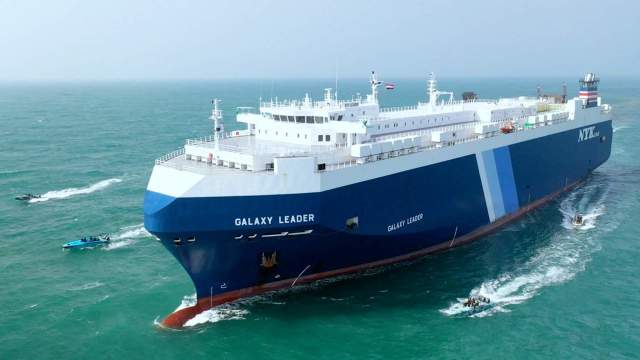The capture of the Galaxy Leader vessel may affect world trade and the geopolitics of the Middle East, experts believe
The Yemeni paramilitary group Ansar Allah has announced that it will seize all vessels passing through the Bab el-Mandeb Strait and related to Israel. Since November 19, the cargo ship Galaxy Leader has already been in captivity. The Yemeni Houthis have de facto joined the Palestinian-Israeli conflict. In addition to the attack on the ship, Ansar Allah launched several cruise missiles on Israeli territory on November 22. Izvestia" figured out what this paramilitary group is, whether it will be able to create serious obstacles to commercial shipping in the Red Sea and whether it will change the balance of power in the region.
"Any Israeli vessel is a legitimate target"
The military leadership of the Yemeni Ansar Allah movement visited the Galaxy Leader cargo ship captured on November 19. The group distributed a video in which General Muhammad Fadl Abdel Nabi announced to the crew that they were "guests of Yemen", were "completely safe" and made an official statement.
— We are participating in the war together with the Palestinian resistance against the criminal Zionist entity. We tell the whole world that Yemen and its armed forces are ready to solve combat tasks in the Red Sea. However, we want to assure that our operations will not threaten shipping and trade in the region. Our target is only Israeli ships. The Bab-el-Mandeb Strait is a red line. Any Israeli vessel — civilian or military — will be a legitimate target for us.
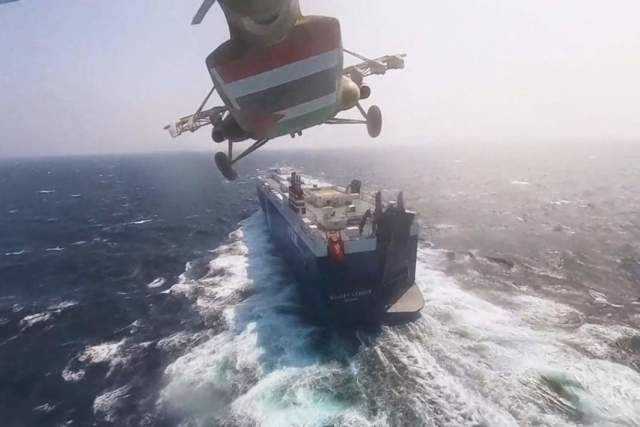
A Houthi military helicopter flies over the Galaxy Leader cargo ship in the Red Sea
Image source: Photo: REUTERS/Houthi Military Media
The general said that the seizures of ships will continue "until the aggression against the residents of the Gaza Strip stops."
Izvestia Reference
The Ansar Allah movement (Houthis) is a paramilitary group of Shiite Zaydites. In 2004, she raised an uprising against the Yemeni authorities. In 2015, it seized the country's capital, Sana'a, and effectively became the ruling political force.
It controls almost all the southern and western regions of the country, including the entire coast of the Red Sea and the Bab-el-Mandeb Strait — access to the Indian Ocean.
The legitimacy of Ansar Allah's authority over Yemen is not recognized by the UN and the Arab countries of the Persian Gulf. The Arab coalition led by Saudi Arabia supports the Yemeni government forces. They control part of the country's territory, but do not have access to the Red Sea.
It is assumed that the Houthis, in turn, enjoy the hidden military and financial support of Iran and Hezbollah.
The cargo ship Galaxy Leader, carrying cars, was going from Turkey to India. According to international insurance companies and open sources, there are no military and dual-use cargo on board. The crew consists of 25 sailors, citizens of Mexico, Bulgaria, the Philippines and Ukraine.
The vessel was flying the flag of the Bahamas, registered in Britain and was leased by a Japanese company. After passing the Suez Canal and half of the Red Sea, the crew turned off the automated identification system (AIS), tracking the vessel by the Marine Traffic service became impossible. Captains of ships traveling separately from caravans often resort to disabling electronic systems — the waters of the Red Sea have been considered a dangerous region for ships for many years.
However, this did not help, and on November 19, an armed landing party landed on board the ship — from a Mi-171E helicopter and speedboats. Almost immediately it became known that it was not a pirate gang that seized the ship, but the Houthi special forces. Galaxy Leader was escorted to the Yemeni port of Hodeidah and taken under round-the-clock security, the crew remains hostage.
Is there an Israeli trace
The Israeli authorities and the ship's operator company announced the absence of ties between the Jewish state and business with Galaxy Leader. At the same time, the media call him the real owner of Ray Shipping Ltd, a company associated with businessman Rami Unger, one of the top 50 richest Israelis.
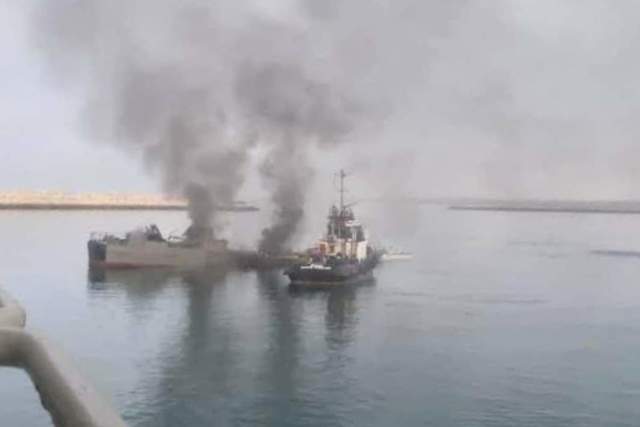
Israeli ship MV Helios Ray fired by Iranian missiles
Image Source: Photo: avia.pro
There have already been emergencies with Ray Shipping Ltd vessels. On February 25, 2021, the Helios Ray ship was damaged multiple times in the Gulf of Oman as a result of several explosions. Maintaining stability, he reached the port of Dubai, no one from the crew was injured.
Then the investigation concluded that the ship was damaged by magnetic mines, and this could be Iran's revenge for the murder of nuclear engineer Mohsen Fakhrizadeh by Israeli special services. Rami Unger himself said that "this is part of the game between the United States and Iran, so they attack Western ships." The Iranian media claimed a close relationship between the businessman and the head of the MOSSAD Yossi Cohen.
It is worth noting that the Israeli businessman is of interest to Iran, Israel's main opponent in the Middle East. Through the problems created by the Houthis to Unger, the Iranian special services can build a long—term tactic of pressure on the MOSSAD and further on the Israeli leadership - seeking for themselves some preferences, or at least the very possibility of a non-public dialogue. It is unlikely that the Houthis could act in isolation from the Iranian special services on their own initiative, although the very existence of the Ansar Allah movement stands on the desire to destroy Israel — this requirement is even written on their flag.
What is in service with Ansar Allah
The armed formations of Ansar Allah have a very diverse set of forces and means. It is based on weapons left over from the Yemeni government army. But a significant amount of weapons comes to the Houthis from partners — from Iran, North Korea, Lebanese Hezbollah.
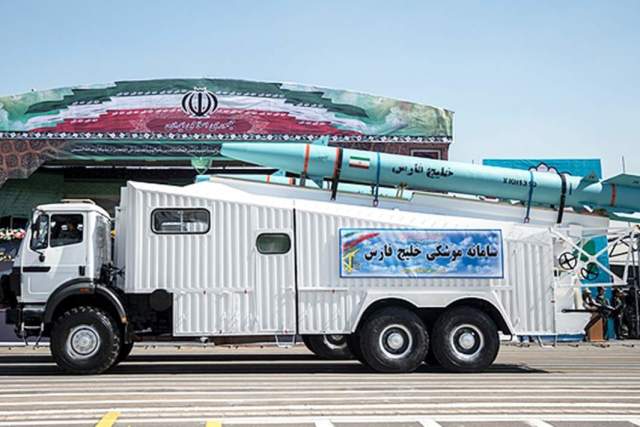
Iran's Khalij-e Fars quasi-ballistic missile
Image Source: Photo: commons.wikimedia.org
The greatest danger to ships and vessels is the Iranian quasi-ballistic missile Khalij-e Fars, converted from the widespread tactical missile Fateh-110. It is capable of hitting large surface targets at a range of 300 km. The weight of the warhead is 650 kg.
Another anti—ship missile is Noor. This is the Iranian equivalent of the Chinese S-802 cruise missile. The radius of action is 120 km, that is, the entire width of the Red Sea. The Houthis have ground-based launchers on a wheelbase, missiles can be fired from anywhere on the coast.
Another type of missile is the anti—ship Ghader, capable of hitting surface targets at a range of 250 km. It has an aviation variant for launching from Mi-171 helicopters, the squadron of which Ansar Allah maintains in a state of airworthiness. The Mi-171 is an export version of the Russian Mi—8AMT, which can be used in transport and assault modifications.
The whole world was able to observe the successful use of the Mi-171 during the capture of the Galaxy Leader. At an ultra-low altitude, the helicopter approached the ship and landed an assault group on the deck. Experts note the professional training of the helicopter crew and attack aircraft operating at the level of the world's leading special forces.
The Houthis also have shorter—range missile systems and air defense systems, mainly of Iranian production, as well as Soviet-made combat vehicles - tanks and armored personnel carriers, artillery.
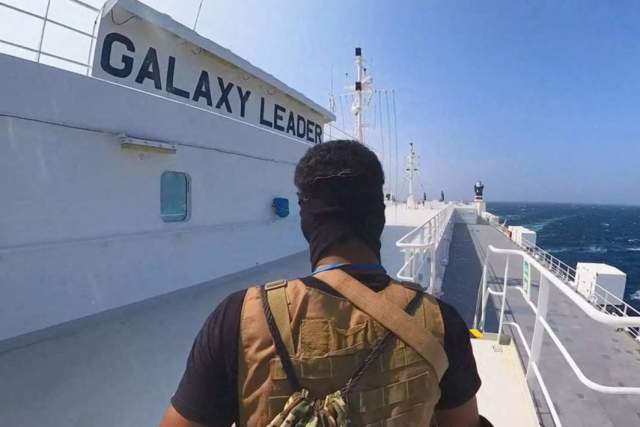
A Houthi fighter stands on a Galaxy Leader cargo ship in the Red Sea
Image source: Photo: REUTERS/Houthi Military Media
A former fighter of the Wagner group with the call sign "Javdet" told Izvestia about his impressions about the combat capabilities of Ansar Allah.
— The Houthis are interesting guys, we crossed paths with them in Africa. They have units trained by Iranian instructors, perfectly equipped and equipped. They have sniper complexes, anti-tank, and even their own combat swimmers. Discipline is at a high level, these are not Somali pirates or Malian bandits. These guys have the drive and motivation.
PR or a real threat
60 to 80% of European maritime trade passes through the Suez Canal and the Red Sea. By capturing Galaxy Leader, the Houthis have shown what they are capable of. Although the ship was literally hugging the African coast, it was nevertheless discovered and captured.
The determination of the Houthis to fight any enemy is evidenced by the fact that the American unmanned reconnaissance drone MQ-9 Reaper was destroyed by the air defense calculation. The drone was shot down by an anti-aircraft missile on November 8, and the Pentagon had to come to terms with this loss, the Americans did not take any retaliatory actions.
Murad Arifi, a researcher at the Center for Strategic Studies of Sana'a, believes that although the Houthis are capable of threatening navigation in the Red Sea, they do not plan to enter into open confrontation with the United States yet.

Houthi fighters gather during military maneuvers near Sanaa, Yemen
Image source: Photo: REUTERS/Houthi Media Center
— The Houthis have not yet put forward any conditions for the release of the ship and crew. Such actions should be regarded from the point of view of propaganda purposes: as an aid to Palestine and a response to the war in the Gaza Strip. In my opinion, the Houthis can release the ship only in case of serious pressure from the international community on their intermediaries — Oman and Iran. Because subsequently, this could seriously affect the use of the Bab-el-Mandeb Strait by merchant ships in particular and the Red Sea in general.
According to the expert, all the threats coming from Ansar Allah are still part of the information war. Their military potential cannot be put on a par with that of the Americans and Israelis in the region.
— I believe that they will not create any forbidden zone for vessels in the region. They simply do not have the strength and means to do this. But even the assumption of a possible threat is already forcing some ships to change their route and go around Africa," the expert added.
According to experts, if the Houthis start checking all merchant ships in the area for involvement in Israel, the United States and the European Union will either have to officially recognize Ansar Allah and negotiate with them on cooperation, or start full-scale hostilities with the Houthis, the forces and means for which NATO simply does not have now.
Alexey Sukonkin
Prokhor Dorenko
